

I really liked it
A classic of poetry that I’ve been planning to read for a while now. I finally bought a copy after reading Cassandra Clare’s series The Mortal Instruments and watching Netflix’s Lucifer, which both reference this work.
Read: February 9 – February 14, 2023
Inferno is the first of Dante’s three-part journey to heaven. First, he must travel through the depths of Hell, then surpass Purgatory, and finally climb Heaven’s mountain. This is because his initial path was blocked by three sins in the form of a leopard, a lion, and a she-wolf. With Virgil as his guide, Dante traverses the dangerous lands of torture and deprived souls.
While I have a physical copy of this book, once again I admit that I’m not the best at reading and understanding poetry, which this is. As such, I searched first on Spotify (though I couldn’t find anything here), then on Youtube, to find an audio reading of this book (since it is a classic and therefore in the public domain). Check out the Greatest Audiobooks compilation reading of Inferno. I read the version translated by Henry Wadsworth Longfellow (who was the first American to fully translate Inferno).
I am supremely grateful that the book I purchased included summaries for each canto (chapter). Otherwise, I might’ve been lost about what was happening in each scene, between the older language and the poetic form of it. I followed along quite well, especially thanks to the audio, but I will definitely have to revisit this book in the future to fully comprehend everything. There are two more parts to this story, Purgatory and Paradise, and while I am not opposed to reading those as well, I’m not jumping at the chance.
It was expected that there would be some description of the torture that the souls faced in Hell, but I am pleased to say that (for me) it wasn’t very graphic. It spoke of horrible torture, but there wasn’t much detailed description of it, so I’m glad to say that this book caused no unpleasant imaginings.
The book is written from the first-person perspective of Dante, who wrote as if he himself actually went on this journey, and he speaks directly to the reader at times, addressing them as such. I’m not typically a fan of this kind of self-insert style of writing, but it works for this book. It’s not like most poetry I’ve seen, which uses a lot of metaphors that I don’t understand; it’s a lot more like prose in a poetic style.
As he travels through Hell with Virgil, Dante meets many famous figures from other literature, including many Greek myths and other prominent figures, some of whom warn him about political strife occurring in Florence, his hometown. (Funnily enough, he describes all of his political opponents burning in Hell, thus raising himself above them.) It seems odd that they would speak to him at all as he passes by, but I suppose it makes sense since he is a living soul. That can’t be something they see every day.
I recommend this book to readers of poetry who enjoy classics and have a bit of a stronger stomach. This book isn’t for everyone, but I found it enjoyable. I also think it’s a great source for writers who work religion into their writing. (Plus, there are some great memes made about this book; check them out.)
Inferno by Dante Alighieri
The Pin-Thief and the Sunflowers by Sofia Federova
*Maggot Dance by G.O. Kayode*
Faust by Johann Wolfgang von Goethe
*North Star Heart by Natasha Silva*
Embers: one Ojibway’s Meditations by Richard Wagamese
Beowulf by unknown
Tigerpetal Press is a small book press dedicated to publishing local authors and poets.